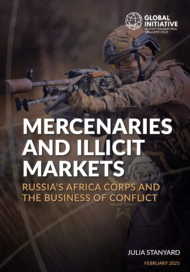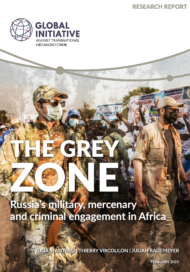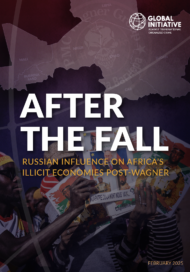Posted on 14 Feb 2025
The Wagner Group mercenary force and its successor, the Africa Corps, have played a pivotal and controversial role in growing Russia’s influence on the African continent. Initially a covert proxy of the Russian state able to exercise some deniability, the Wagner Group soon became the most influential and public form of Russian engagement in Africa, particularly in the Sahel and Central Africa. Wagner was unique in the scale and boldness of its activities and in navigating the grey zone where licit and illicit economies meld.
Implicated in murders, massacres, rapes, and other atrocities in some African countries, its mercenaries have been accused of terrorizing civilian populations, carrying out industrial-scale smuggling of gold, diamonds, and timber, notably in the Central African Republic (CAR), spearheading political disinformation campaigns and election-rigging.
This paper reviews how Russia’s Wagner Group and the Africa Corps have developed since the death of Wagner’s leader, Yevgeny Prigozhin, in August 2023. It includes their evolving role in illicit markets and the implications for African peace and security. It builds on research published in the Global Initiative Against Transnational Organized Crime (GI-TOC) ‘s February 2023 report, The Grey Zone: Russia’s Military, Mercenary and Criminal Engagement in Africa.
The study is structured following five key findings:
- 1 – The expanding influence of Africa Corps/ Wagner Group, their involvement in atrocities, and their role in illicit economies undermine African security;
- 2 – Africa Corps retains many of Wagner Group’s military, political, and economic goals and uses similar strategies to achieve them;
- 3 – Wagner Group’s residual operations and associated illicit activities have continued in Africa;
- 4 – There has been a change in how Russian PMCs operate, both in Russia’s war in Ukraine and in Africa;
- 5 – Worsening security, illicit economies, and changing narratives challenge Africa Corps’ and Wagner’s Sahel expansion.
The report offers a series of considerations and recommendations to understand the latest developments in Russian engagement in Africa.
Key suggestions include utilizing diplomatic channels to pressure Russia’s supply lines by air and sea, investing in efforts to counter Russian disinformation, and increasing public messaging about the violence and security failures associated with the Africa Corps and Wagner Group. The report also emphasizes the need for rapid and coordinated sanctions against Russian mercenary actors.
Furthermore, it advocates for engaging with states that host a Russian presence rather than isolating them by prioritizing assistance to counter illicit economies, support state stability, develop strategies to address the security challenges posed by private military and security contractors, and the need explore broader methods to counter disinformation and mitigate its global political impact.




